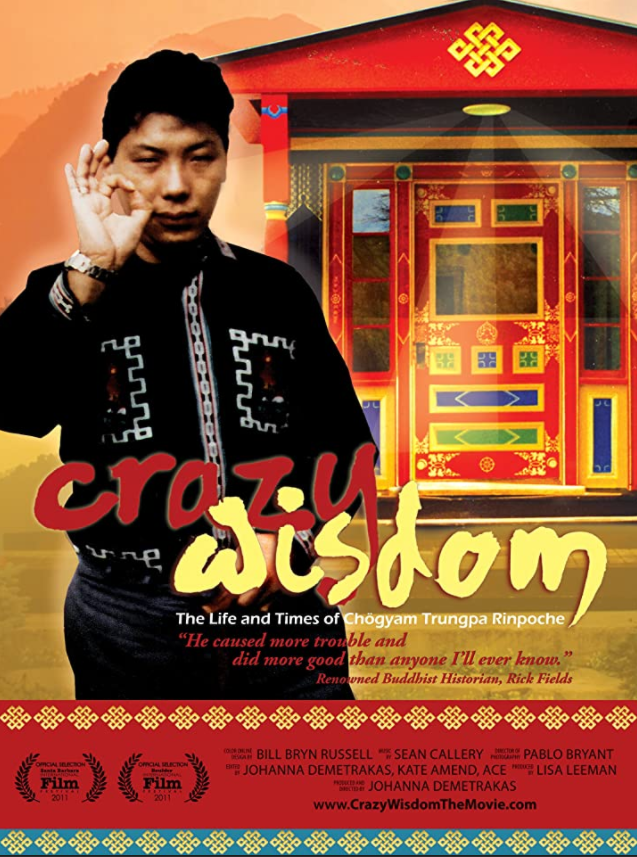
CRAZY WISDOM – THE MOVIE
Earth, water, fire, and all the elements,
The animate and the inanimate, the trees and greenery and so on,
All partake of the nature of self-existing equanimity,
Which is quite simply what the Great Wrathful One is.
In the spontaneous wisdom of the trikaya
I take refuge with body, speech and mind.
In order to free those who suffer at the hands of the three lords of materialism
And are afraid of external phenomena, which are their own projections.
I take this vow in meditation.
The Saddhana of Mahamudra (excpt)
“He caused more trouble and did more good than anyone I’ll ever know” – Rick Fields
Last Wednesday night I went to the Los Angeles premiere of Crazy Wisdom, a film by Johanna Demetrakas about about the life of Chögyam Trungpa Rinpoche. As a long time and fervent reader of his writings (I think I read pretty much everything he wrote) I was very curious about the film (also working on getting to the screening with no expectation!). I came across CTR in book form a long time ago and it’s only recently, mostly through the trailer of the film, and the media posted on The Chronicles of Chögyam Trungpa web site, that I could see and hear who Trungpa was like as a living person (he’s pretty lively in his books too but you get the point).
Trungpa was a very controversial man for the reasons that most people know. Although he’s credited for introducing buddhism in the west, in my opinion his more important mission was to break the rigid mold of spiritual materialism and shatter people’s pre-conceptions of what a ‘realized’ person from the East is like.
In this context you can imagine what it was like for the filmmaker to make the decisions about what the film should be like! So much to choose from and articulate! Very much like curating an exhibition about an important artist. Before seeing the film I was wondering: how much of the film is going to fuel (or avoid) controversy, to what extent the western teachings of Trungpa going to be covered, how much of it is going to be an infomercial for Shambhala International? So many possibilities! Trungpa the artist, Trungpa the teacher, Trungpa the disrobed monk, Trungpa the leader, Trungpa the innovator, Trungpa the King, Trungpa the bad boy, Trungpa the General, so many Trungpas so little screen time!
When I got to the screening it became obvious that no one was there to watch just a film. It felt like a celebration, a gathering. I don’t know Ms Demetrakas personally but I could see her being a very happy person, maybe a bit anxious of course. After some snacks and social interaction (thank you filmmakers) we all got to sit down and wait a bit. There is no way to describe what the energy in the screening room was like, it was very peaceful and happy and electrical at the same time.
The film itself turned out to be like a documentary about a big mountain. Majestic but humble at the same time. Majestic because the subject matter is immense and larger than anything we know but humble and measured also because the narrator never got in the way. I found that it was an egoless film, no tripping or gimmicks. Elegant form, a nice portrait. It’s a well edited collage of footage, photos, testimonies from people who had come in contact with Trungpa, studied with him, collaborated with him, lived with him. One could really feel that he had infused those people’s lifes with tremendous energy and heart… and basic sanity. It was fun to see Roshi from ZCLA being interviewed in the film, next to the wooden Manjusri that is on the altar in the zendo.
At the end of the screening I was relieved that it was such an elegant piece. That is what came to mind right away, the sense of elegance. This is a well balanced film that would talk to many, practitioners and non-practioners alike. It is not a be-all-end-all encyclopedic documentary (it would be impossible to make anyway). It is a movie about an amazing man from a remote land who became an American landmark and changed the landscape somehow. As far as the controversial subjects were concerned the movie is honest and objective without laying too much weight on any issue in particular.
There are some intense moments in the film, for instance when a student of Trungpa bursted out in tears on camera, apparently because he was missing him so much, like an lost old friend. Footage of old and sick Trungpa exuded sadness, the footage of his cremation was heavy and grandiose at the same time. Afterwards I reflected on how actually I had been fortunate to not meet CTR and have him as a friend, simply because I would miss him so much! I miss him not having ever known him! I particularly enjoyed just watching and hearing CTR. It was spending time with a lively imprint of him instead of reading the lines in the books.
Does the movie have any flaws at all in my view? Yes and just to be honest I can point them out here as they are rather minor. I didn’t really like the written on-screen explanations of what dharma, bodhisattva etc are. For me those are experiential notions that cannot be easily captured by words while at the same time I understand why they are to be spelled out for the benefit of general audiences. It is a documentary after all. Graphically I didn’t really like the treatment given to on the typeface on-screen (the After Effect canned effects). I thought this removed from the very elegance of the film. Also I didn’t understand why the Saddhana of Mahamudra wasn’t presented in more details at the beginning of the film since a long passage and the starting point of the film were based on that text. Finally I found that perhaps more attention could have been given to CTR’s legacy, how buddhism and other fields such as psychology have been impacted by his work. How can we see today the results of his work? Who are those who never met him but still benefit from his teachings?
What else is there to say… nothing. Just thank you to Johanna Demetrakas and her crew. And I want to see it again.
The dharma is used for personal gain
And the river of materialism has burst its banks.
The materialistic outloook dominates everywhere
And the mind is intoxicated with wordly concerns.
Under such circumstances, how can you abandon us?
The time has come when your son needs you.
No material offering will please you
So the only offering I can make
Is to follow your example.
The Saddhana of Mahamudra (excpt)
